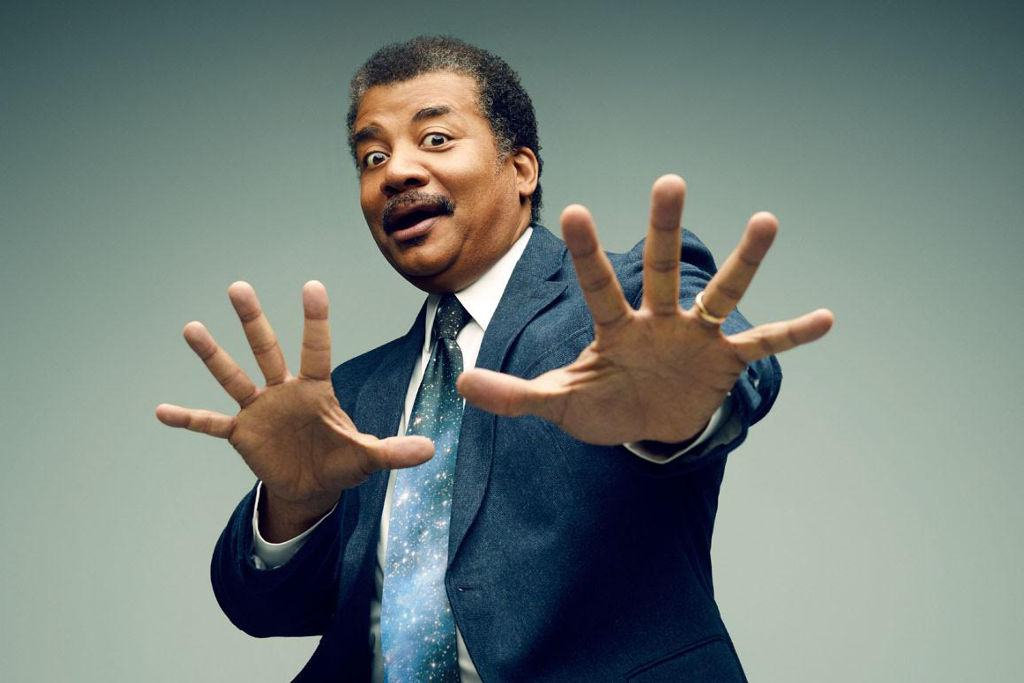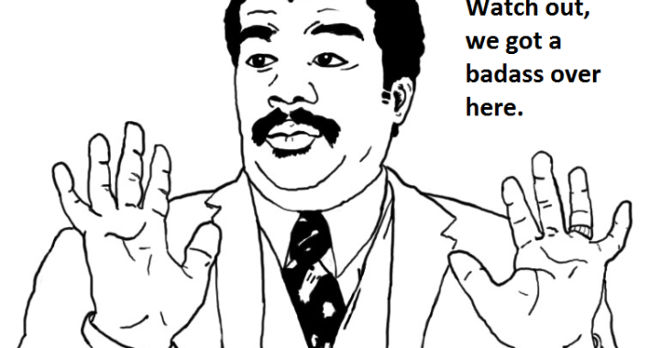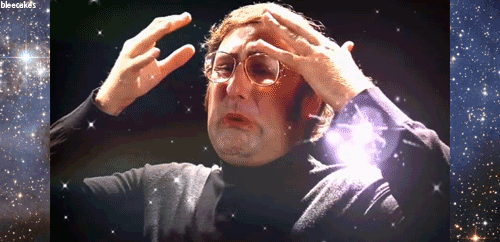We Need A Government That Cares More About Science (And Six Other Things We Learned From Neil deGrasse Tyson’s Melbourne Talk)
“The solar system should be our backyard."

Being the most famous (see also: sexiest) astrophysicist in the world, Neil deGrasse Tyson often gets sidetracked into conversations about things that aren’t particularly astrophysical.
A prominent face in science news cycles, he’s become the poor guy on the receiving end of a lot of inane and irrelevant conversation — like the time he tore apart what we thought was the bulletproof science behind Gravity, the fact that he’s now more commonly known as a “Pluto-hater” than scientist, or that the most iconic image of him is this.

He may be one of the most influential scientific voices of our time, yet our pop culture buffoonery has reduced him to the high school science teacher in sex ed class, answering a lot of stupid, self-involved questions about our basic anatomy.
So it’s hard to imagine the kind of relief and joy that must run through his knowledgeable (and sexy) head when he finally gets to talk candidly about the cosmos. On the first night of his Australian speaking tour on Friday, he got the chance to do just that.
Here are some lessons we learned from everybody’s favourite astrophysicist.
–
Don’t Get Him Started On Pluto:
So what does the “Pluto-hater” actually have to say about this whole controversy?
Well, Tyson is adamant that he wasn’t involved in the discovery that led to the ex-planet’s demotion. The crime should actually be pinned on two astronomers from the mid ’90s, David C. Jewitt and Jane Luu. While investigating the outer reaches of the solar system, these two found the first object in the Kuiper Belt, which bore a striking similarity to Pluto. In 2006, the scientific consensus eventually decided that Pluto was not a planet but a “dwarf planet” — a title some scientists are still trying to resist.
Despite his innocence in the shift, Tyson recalls the mountain of hate mail he’d received from the world’s eight-year-olds, angry crayon scribbles decrying him for the lack of the non-planet in their solar system textbooks. It’s been nine years, guys, and he’d like it if we all just accepted the science and left him alone.
Dear Pluto, Lookin’ good. But you’re still a Dwarf Planet — get over it. Love, Neil deGrasse Tyson pic.twitter.com/qBBD9feG6e
— Neil deGrasse Tyson (@neiltyson) July 15, 2015
–
He Doesn’t Actually Like Being On TV:
It’s nice to think that Dr. Tyson just loves an opportunity to appear on the news and talk about the science behind the latest space happening — but Dr Tyson really doesn’t care for it. “Actually, my passion is to stay at home.” He’s the kind of guy who’d much rather be watching a movie, and not talking to people about things. Then the phone rings.
“Something flinched in the universe and I gotta go on TV and talk about it,” he says. It’s a tough life.
–
We Need Governments That Care About Science:
When the conversation turns towards heading back to the moon, Dr Tyson gives an exasperated flurry of hands: “The solar system should be our backyard.”
Yes, we will go back at some stage — but he insists we should also be looking further and aiming higher in our space travel ambitions. The only real obstacle in future space travel will be money, and therefore in electing politicians who actually care enough about research and development to fund scientific endeavours.
Dr Tyson thinks we can’t necessarily rely on the private sector (sorry, Elon Musk) to pioneer a human path through the universe. Historically speaking, the first step into a new frontier has always been made by governments; private industry simply follows. If all else fails, Dr Tyson admits that he’ll be very tempted to surreptitiously ask the Chinese government to write a memo stating they’ll be setting up military bases on Mars. Once the Pentagon catches wind of it, it’ll be Space Race 2.0: “In ten months, you’ll have military bases on Mars. One month to design and build the ship. nine months to get out there,” he says.
–
The Only Time He Feels Like Slapping Somebody Is:
Dr. Tyson’s biggest pet peeve is the idea of people hand-picking science they do and do not believe in — or, as he puts it, “When someone so fully takes for granted the amazing technology in their arm’s reach.”
For Dr. Tyson, the worst of it all is when someone disputes the science behind something like climate change, then reaches for their smartphone to make an international call. “Where the hell do you think you got a smartphone from? Science did all of that!” It’s everything, or nothing; anything in between leaves your cheek vulnerable to the righteous palm of Dr Tyson’s hand.
–
The Scariest Thing Is The Limitations Of Our Intelligence:
Tyson points out the 2% genetic difference between chimps and humans, and the huge gap that it actually represents. You couldn’t hope for a chimp to understand times tables, let alone trigonometry or astrophysics. Imagine if there was life elsewhere in the cosmos that was 2% ahead of us; what would that make of human intelligence?
The real kicker is, does human intelligence even have what it takes to truly understand the science of the universe? After centuries of research and studying, we’ve only scratched the surface on the nature of the cosmos. Can we ever know all of it?

–
He Has Some Pretty Big Questions:
“What the hell dark matter is or isn’t. Or dark energy. I’d like to know what those are before I die.”
But there’s a caveat: Tyson will never be fully satiated with the answers to these questions, because their answers will point to even bigger and more meaningful questions.
The history of discovery has always worked this way. From new discovery, “up arises questions previously undreamt of,” he says. So yes, Dr Tyson would very much like to know what the hell dark matter and dark energy is please, but his ultimate questions are “those that none of us yet know to ask.”
–
He’ll Moonwalk For Us, On One Condition:
While presenting at a 2013 conference featuring actual moonwalkers Neil Armstrong and Buzz Aldrin, Dr. Tyson felt compelled to honour them the only way he knew how: the moonwalk.
As he tells us about that night, the crowd at the Melbourne Convention Centre erupts into raucous encouragement and Tyson is forced to make a deal: he will indeed grace us with a moonwalk — IF we get an Aussie on the moon.
The Aussie Space Race has begun.
–
An Evening With Dr Neil deGrasse Tyson
Brisbane: Sunday August 16 @ BCEC — tickets here
Sydney: Saturday August 22 @ Hordern Pavillion — tickets here
Canberra: Sunday August 23 @ Llewellyn Hall — tickets here
–
Sean is a freelance writer based in Melbourne. He has written for FilmInk and Beat, and tweets from @ssebast90